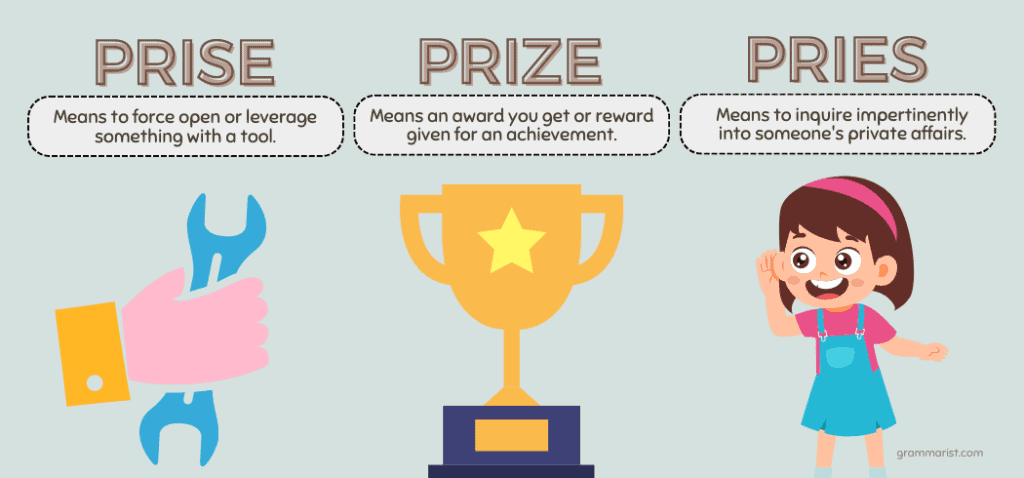Keeping definitions and usage straight when it comes to homophones is hard enough between two words that sound alike, but things get really difficult when there are three words with the same pronunciation. Throw in some regional spellings, and it’s just a mess. A perfect example is the trio of words “prize,” “prise” and “pries.” So, I’ll explain their meanings and show you the differences in their uses.
Prise vs. Prize vs. Pries: What’s the Difference?
“Prise” is a verb mostly used in British English that means to force open or leverage something with a tool, usually by applying force. It’s the same as the American spelling “prize” in its verb form.
That brings us to one that has triple meanings, and that’s “prize.” You can use it as a noun, an adjective, or a verb. As a noun, it means an award you get or some kind of reward given for an achievement, like winning a competition or contest.
As an adjective, it’s used to describe how something is held high in regard or has great value.
As a verb, it means to value something or hold it dear to you but is often accompanied by the suffix -ed. But it can also be a verb to describe wrenching something open.
- Noun: I won a prize for my science fair project!
- Adjective: The prized bull won the contest.
- Verb: My grandmother’s jam was prized as the best in town.
- Verb: Just prize open the rusted chest so we can see what’s inside.
“Pries” is similar to “prize” in its verb form and is the third-person singular form of the verb “to pry.” We use it to describe how you force something open or apart. Apart from that, “pries” also means to inquire impertinently into someone’s private affairs.
Prise or Prize in the UK
In British English, “prise” is the preferred spelling for the verb, meaning to force open or lever. But in American English, the spelling “pry” is more common, with “pries” used as its third-person singular form.
What Is a Synonym for Prise?
- Lever.
- Force open.
- Crowbar.
- Extract.
Prize Examples in a Sentence
- Amy won a prestigious prize for her outstanding research in the field of neuroscience and microbiology.
- The author was awarded the Booker Prize for her novel, which explores the history of piracy in Newfoundland with a Fantasy spin.
- The Nobel Prize in Physics was presented to a team of local scientists for their ground-breaking work in quantum mechanics.
- I can prize open the chest, but I might damage it.
- My besties and I don’t buy one another gifts because we consider our friendship to be the greatest prize of all.
- My sister prized her grandmother’s antique jewelry above everything else in her possession.
Prise Examples in a Sentence
- Apparently, the burglar used a crowbar to prise open the window and gained access to our house while we were away.
- My son carefully prised the lid off the jar to avoid spilling the pickle juice.
- They had to prise apart the tangled branches to clear an area to build the swing set.
Pries Examples in a Sentence
- My mother pries into her neighbors’ lives by spying through the window and listening over the fence.
- He pries open the locked door with nothing more than a thin piece of metal.
- The journalist pries into the politician’s past, hoping to uncover a scandal he can use for his next story.
Homophones Are Hard
Always remember to think about your audience when using alternative spellings of certain words. America often uses different versions of words from Canada and the UK, and mixing them up can sometimes lead to confusion for people.


